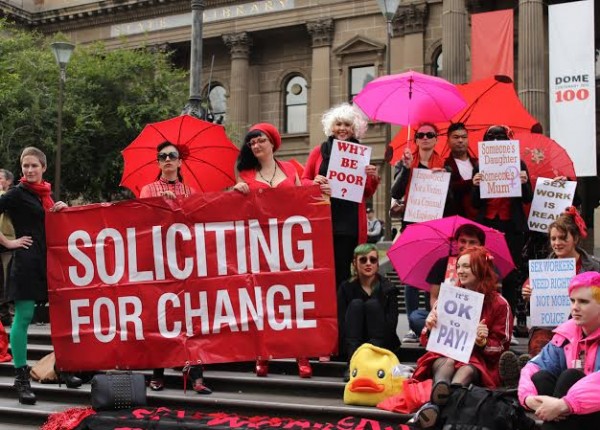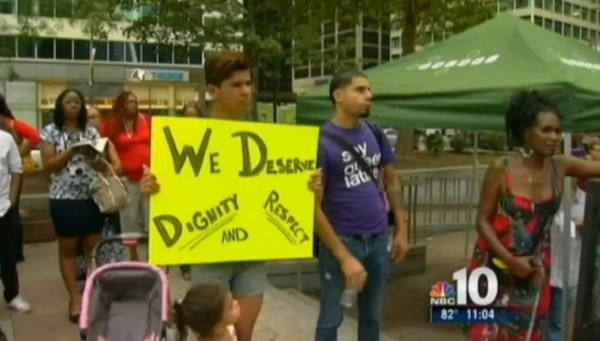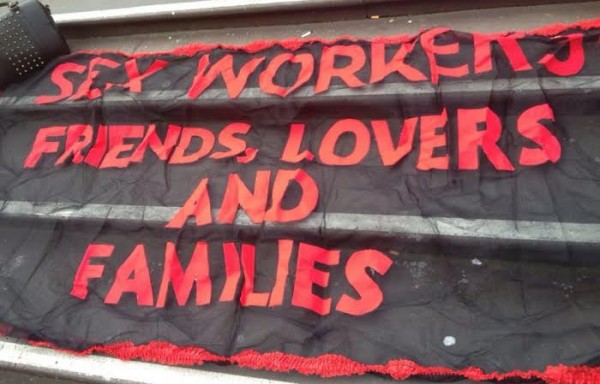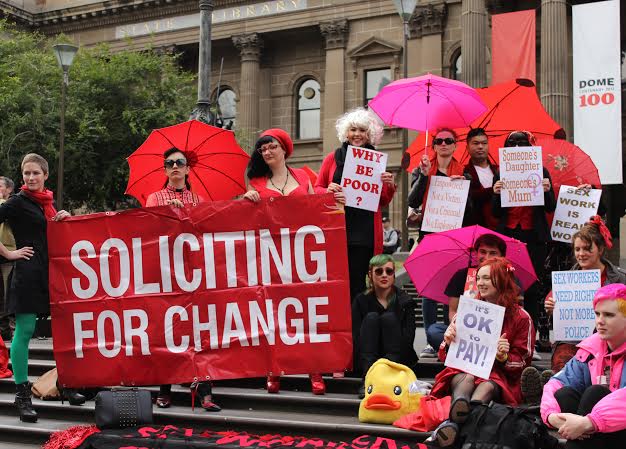
After the Sydney Morning Herald published an editorial promoting the Swedish model of criminalizing sex workers’ clients, exploiting the murder of Australian street sex worker Tracy Connelly to further an anti-sex worker agenda, many sex workers responded to the piece by writing to the news outlets that printed or re-printed it. Jane Green wrote a version of the editorial that appears below and sent it to both the Sydney Morning Herald and The Age. The Sydney Morning Herald didn’t respond or return phone calls. The Age did, eventually, but after two and a half weeks of discussions decided against running an edited version, indicating they’d provide better access to sex workers “next time.” We at Tits and Sass thank Jane for allowing us to post the what other outlets declined to publish.
As a Victorian sex worker, I looked on in horror at the article seeking to exploit the death of sex worker Tracy Connelly, published in the Sydney Morning Herald days before the International Day to End Violence Against Sex Workers.
It is horrifying and traumatizing to the sex worker community to have an article proposing the Nordic Model of criminalizing sex workers’ clients—proven to have devastating effects on sex workers’ health and safety—released on a day used to protest violence against sex workers. Horrifying, but not surprising.
Looking back on the month of sex worker Tracy Connelly’s death, July 2013, which encompassed four high profile sex worker deaths internationally, I am struck not just by the tone of the writing, but by what it highlights to me as a sex worker regarding what the media are willing to, or interested in, discussing. It tells me what is newsworthy about our lives.
You will report our deaths. But in death we are nameless: “Strawberry Mansion man dismembered prostitute,” St Kilda prostitute brutally murdered.” Let me remind you, these are our names:
- Dora Oezer (Kusadasi, Turkey, 9th July)
- Petite Jasmine (Vasteras, Sweden, 11th July)
- Diamond Williams (Philadelphia, USA, July)
- Tracy Connelly (Melbourne, Australia, 22nd July)
While other murder victims are reported by their gender (“murdered woman,” etc), or their name (for example, here in Victoria, Jill Meagher), sex workers are so often reduced to one-dimensional caricatures. We are obviously not whole people, so why depict us as such? This type of reporting plays into the stereotype of sex worker as disconnected victim—someone who can disappear and have no one notice because they have no family or friends. Let me make this clear: sex workers have family and friends. We are connected. We are connected enough that when our friends are murdered we organize an international protest. Which will get very little press coverage because you will not report our lives.
The struggles of living sex workers go unreported. Every day, around the world, sex workers are struggling to have their voices heard. Sex worker organizations and sex workers call for decriminalization. Sex work is work. Labor rights and human rights for sex workers would save sex workers’ lives.

But apparently, a discussion of those issues would not sell newspapers. So, we are viewed through the lens of crime reporting and the coverage of our deaths, except for when you give our voice to those who seek to harm us. I mean that literally. Abolitionist groups and anti-sex work groups are allowed to speak unchallenged in the media as if they are speaking on sex workers’ behalf. This not only directly harmful to sex workers, causing us intense distress, but contributes to misinforming the public and setting back law reform that would have positive outcomes for sex workers’ health and safety.
An obvious example is the piece that prompted me to write this editorial, by Melinda Tankard Reist, championing the Nordic Model, which criminalizes the purchase of sex, effectively criminalizing the industry (because making it illegal for my clients to pay me directly impacts me). It is deliberately misleading in parts, for example, mentioning that Australia has ratified Article 6 from the UN Protocol to Prevent, Suppress and Punish Trafficking in Persons and yet strangely failing to mention that both the United Nations and World Health Organization recognize sex work as work1. It uses stigmatizing language, again contrary to standards set by the United Nations and the Scarlet Alliance (Australian Sex Workers Association)2.
Another particularly egregious example of anti-sex work groups attempting to speak on sex workers’ behalf appeared in the Guardian in June. Kelly Hinton and Kathleen Maltzahn highlight Project Respect—which is not a sex worker organization—as if it is the only specialist organization supporting women “subjected to violence in the sex industry” in Victoria. This is actually a blatant lie that seeks to obscure the work of actual sex worker organizations in Victoria, VIXEN, Victoria’s peer-only 3 sex worker organization (an unfunded organization), and RhED, specialist services for the sex industry in Victoria, partly peer4 (funded as a program of ISCHS). There is also the Scarlet Alliance (Australian Sex Workers Association), of which VIXEN is a member and RhED an associate member, an umbrella organization working towards sex worker rights across Australia.

Finally, there’s Melbourne Sexual Health, instrumental in combined lobbying with sex worker organizations against mandatory health testing for sex workers in Victoria, recently reduced to three month intervals. In a country where medical research long ago proved that sex workers have better sexual health and lower rates of STI’s 5 than members of the general public, many sex workers consider forced state health exams as a condition of work to be a form of state violence against sex workers.
Project Respect and abolitionist groups like them seek to “help” sex workers by applying the Nordic Model, an essentially abolitionist model which criminalizes clients, forcing sex workers underground. This ad hoc abolitionism adds to an environment of hostility and stigma, increasing violence against sex workers. Petite Jasmine was murdered under this regulatory regime.
I have never had anyone adequately explain to me how abolishing my occupation helps me in any way. I will never believe it could make me safer. More importantly, I did not ask and do not wish for non-sex workers, those who would see my right to work abolished, to speak on my behalf. Allowing abolitionist groups or non-sex workers to speak for sex workers does two things: It misinforms the message. Those speaking out on sex work must be sex workers because we speak from the lived experience of sex work. It also takes up space. Sex workers are a marginalized group who have to fight for space to get their message heard. Stop giving sex worker space away.
Sex workers are capable of speaking up for ourselves and do so everyday—on Facebook, on Twitter, in person (to clients, to friends, to family), through OUR sex worker organizations, in public, and in protest when our peers and friends are murdered. What might be nice is if you reported on that.
1. UN AIDS Terminology Guidelines, MidTerm Additions, 2011, p19. WHO – Toolkit for Monitoring and Evaluation of Interventions for Sex Workers, 2009, page ix. ↩
2. Use of the term “prostitute” is against United Nations, World Health Organization, Scarlet Alliance (Australian Sex Workers Association) and Vixen (Victoria’s peer only sex worker organization) standards.↩
3. Peer only: those involved at all levels of an organization are drawn only from the relevant peer group, for example, in a sex worker organization this would mean all involved would be sex workers.↩
4. Partly peer: an organization that has some commitment to peer involvement, but is not a peer only organization. ↩
5.The example of New South Wales is given to highlight than in an environment of decriminalization health outcomes remain optimal (although studies show sex workers health outcomes are good regardless of the regulatory regime due to peer health promotion etc.) ↩

What is wrong with calling oneself a prostitute? What is so shameful about the word “prostitute”?
Did you even read the article? Nothing is wrong if a sex worker chooses to call themselves a prostitute. The problem is when the media and wider community use that term, ESPECIALLY in regard to victims of murder. Then it becomes dehumanizing and gross.
I think Andrew Hunter summarises the Australian sex worker movements adoption of the term ‘sex work’ really well: “it pulled no punches.”
The relevance of such terminological debates is different depending on which country you are in – for Australia the preference for the term ‘sex work’ is a result of the history of the movement here. You can read about it more in this article from 1992
http://www.scarletalliance.org.au/library/hunter_92/
Despite the fact that this is an amazing and important piece I feel that the names of uor fallen should include the hundreds of trans* sex workers that are remembered every year at Transgender Day of Rememberance.
Or do only cisgender lady hookers count?
I’m not sure why you feel trans women are excluded in the piece; Dora and Diamond were both trans and are clearly mentioned by name.
I was unaware of that and unable to follow their links originally. I apologize for the mistake. That said, there are still a lot more names that should be on that list.
Hello Hexe,
I was one of the coordinator of the protests for Dora and Jasmine last July. This blog post only mentions 4 names of sex workers that led to protests and public actions. It is not saying that those were the only sex workers that were murdered this month or that year.. In Turkey for example, between 2008 and 2012, 30 trans women were murdered, most of them sex workers. This is horrifying, and those are only the murders that were reported. You can read the press release of the International Commitee on the Rights of Sex Workers in Europe here: https://jasmineanddora.wordpress.com/media/press-releases/press-release-from-icrse/
I’d like to point out that anyone can submit names for Dec 17 at any time on the site: December17.org.
Standing ovation for this editorial.
And shame on the newspapers fr not publishing it. How cowardly.